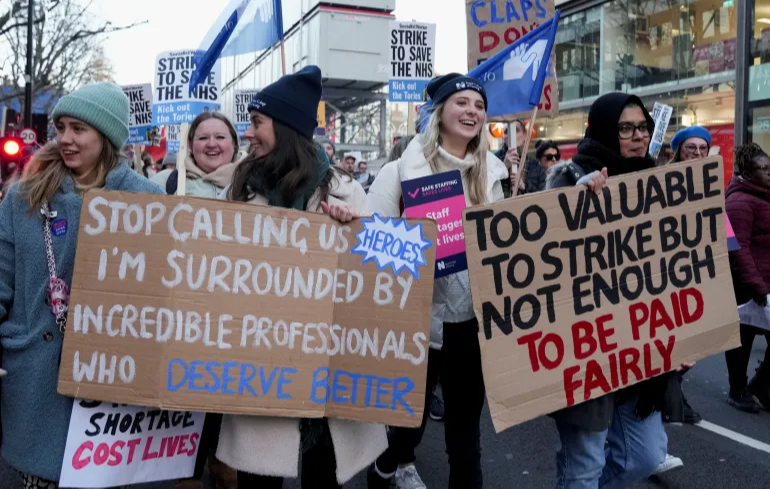
Prime Minister Rishi Sunak says he is ‘sad’ and ‘disappointed’ about widespread strikes but refuses to negotiate.
London, December 25 (RHC)-- Britain’s health workers have announced a new round of strikes in January as their long-running dispute with the government over pay and conditions is set to continue into 2023. Thousands of nurses will strike again on January 18 and 19 after walking out two days in December, the Royal College of Nursing said over the weekend. They are seeking pay increases in line with inflation.
Prime Minister Rishi Sunak told reporters he is “sad” and “disappointed” about widespread strikes, but he insisted that refusing to negotiate on public sector pay was the “right thing” in the long term. Strike dates for the nurses union in Scotland are also expected to be announced in the new year after it voted to reject a pay offer from the Scottish government this week.
Inflation stood at 10.7 percent in November, driven largely by food and energy price rises in the wake of the COVID-19 pandemic and Russia’s invasion of Ukraine. “I do not wish to prolong this dispute, but the prime minister has left us with no choice,” Royal College of Nursing General Secretary Pat Cullen said on Friday.
Ambulance workers represented by the GMB union have also scheduled a new date for action on January 11 after suspending another walkout later this month. “People across the country have been wonderful in backing us, and we care so much about them too,” GMB National Secretary Rachel Harrison said. “That’s why we are suspending the proposed GMB industrial action on the 28th of December.”
Health minister Steve Barclay said unions had announced co-ordinated strikes in January “to cause maximum disruption at a time when the NHS [National Health Service] is already under extreme pressure.” Barclay noted that ambulance staff on picket lines had raised concerns about working conditions, and he said it was important to use the extra time to keep talking about how to make the NHS a better place to work.
The impact of nurses strikes in England will be widened in the new year with the number of NHS trusts involved increasing from 44 to 55. The prime minister defended the government on Friday as acting “fairly and reasonably” on this “difficult question” and insisted he could not budge or would risk stoking inflation.
But Cullen said the industrial action by nurses was due to government intransigence. “The government had the opportunity to end this dispute before Christmas, but instead they have chosen to push nursing staff out into the cold again in January,” she said. “Staff shortages and low pay make patient care unsafe,” Cullen argued. “The sooner ministers come to the negotiating table, the sooner this can be resolved. I will not dig in if they don’t dig in.”
Angela Rayner, the deputy leader of the opposition Labour party, accused the government of taking a “scorched-earth” approach to talks. “It’s high time this sorry excuse for a prime minister started doing his actual job by getting all sides around the table to resolve this and avoid disruption,” she said.
The prime minister’s refusals to consider increased pay mean there is little chance of industrial disputes ending. Border staff are the latest public sector workers to walk out. Military personnel are checking passports at UK airports after around 1,000 Border Force staff walked off their jobs on Friday at facilities including Heathrow, Gatwick, Glasgow and Manchester.
Postal deliveries, highway maintenance and driving tests are also being disrupted by strikes. Further travel difficulties loomed on Saturday, Christmas Eve, when most train services were expected to be cancelled.

